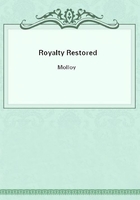
第25章 CHAPTER IV.(4)
Now James, after his fashion, made love to Mistress Hyde, who encouraged his advances until they reached a certain stage, beyond which the judicious maiden forbade them to proceed unless blessed by the sanction of holy church. The Duke, impatient to secure his happiness, was therefore secretly united to Mistress Hyde in the bonds of matrimony on the 24th of November, in the year of grace 1659, at Breda, to which place the Princess of Orange had returned. In a little while, the restoration being effected, the duke returned to England with the king, leaving his bride behind. And Chancellor Hyde being presently re-established in his offices, and settled in his residence at Worcester House in the Strand, sent for his wife and children; the more speedily as he had received an overture from a noble family, on behalf of "a hopeful, well-bred young gentleman," who expressed himself anxious to wed with Mistress Anne.
The same young lady had not long returned, when she informed her husband she was about to become a mother; whereon the duke, seeking the king, fell upon his knees before him, laid bare his secret, and besought him to sanction his union, "that he might publicly marry in such a manner as his majesty thought necessary for the consequence thereof;" adding that, if consent were refused, he would "immediately take leave of the kingdom and spend his life in foreign parts." King Charles was astonished and perplexed by this confession. James was heir, and as such it behoved him to wed with one suited, by reason of her lineage, to support the dignity of the crown, and calculated by her relation towards foreign powers to strengthen the influence of the throne.
The duke was fully aware of this, and, moreover, knew he could without much difficulty have his marriage annulled; but that he did not adopt this course was an honourable trait in his character; and, indeed, his conduct and that of the king was most creditable throughout the transactions which followed; an account of which is set forth with great minuteness in the "Continuation of Edward Hyde, Lord Clarendon's Life."Without the advice of his council, the king could give no satisfactory reply to his brother. He therefore summoned two of his trusty friends, the Marquis of Ormond and the Earl of Southampton, whom he informed of the duke's marriage, requesting them to communicate the same to the chancellor, and return with him for private consultation. The good man's surprise at this news concerning his daughter was, according to his own account, exceeding great, and was only equalled by his vast indignation.
His loyalty towards the royal family was so fervent that it overlooked his affection to his child. He therefore fell into a violent passion, protested against her wicked presumption, and advised that the king "should immediately cause the woman to be sent to the Tower, and to be cast into a dungeon, under so strict a guard that no person should be admitted to come to her; and then that an act of parliament should be immediately passed for the cutting off her head, to which he would not only give his consent, but would very willingly be the first man that should propose it." All this he presently repeated to the king, and moreover, assured him an example of the highest severity, in a case so nearly concerning himself, would serve as a warning that others might take heed of offences committed against his regal dignity.
News of this marriage spread throughout the court with rapidity, and caused the utmost excitement; which in a little while was somewhat abated by the announcement that the king's youngest brother, Henry, Duke of Gloucester, was taken ill of small-pox.
This young prince, who is described as "a pretty boy," possessed parts which bade fair to surpass his brothers. He was indeed associated by his family with their tenderest memories, inasmuch as he had been with his father on the sad day previous to his execution. On that melancholy occasion, Charles I. had taken him upon his knee, and said to him very tenderly, "Sweetheart, they will cut off thy father's head," at which the boy shuddered and turned pale. "Mark, child, what I say," continued the unhappy king, "they will cut off my head, and, perhaps, make thee a king;but mark what I say, you must not be made king as long as your brothers Charles and James are alive, for they will cut off thy brothers' heads when they catch them, and cut off thy head at last; and therefore I charge you not to be made a king by them."To which the lad replied very earnestly) "I will be torn in pieces first." Sometime after the death of his father he was allowed to join his family in France, and, like his brother James, entered the army of that country. On the restoration, he had returned with the king, and, three months later, this "prince of very extraordinary hopes" died, grievously lamented by the court, and especially by his majesty, who declared he felt this loss more than any other which had previously fallen upon him.